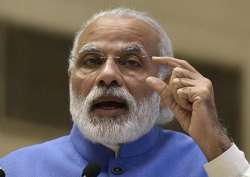Indian civilisation stands tall overcoming obstacles, says PM Modi
Prime Minister Narendra Modi today said that some people are trying to divide the society on basis of caste and religion but Indian civilisation always overcomes such challenges.

Prime Minister Narendra Modi today said that some people are trying to divide the society on basis of caste and religion but Indian civilisation always overcomes such challenges.
The Prime Ministers remark came during the inauguration of the seven-day long Sri Ramakrishna Vachanamrita Satram via video conferencing.
"Sri Ramakrishnas teachings are relevant to us today, when we are confronted with people who use religion, caste to divide and create animosity," Modi said.
"Our civilisation stands tall, overcoming obstacles and whenever the history of human civilisation entered into the era of knowledge, it is India that has always shown the way," Modi said.
"Sri Ramakrishna broke the mental barriers that kept us apart. He lived the Muslim way of life, he lived the Christian way of life, he practised tantra," Modi said, adding, "the reality is one and the same... the difference is in name and form."
Lauding the role of Social reformer Sri Narayana Guru in transforming Kerala, Modi said, "Our Saints did things that may seem seemingly small but the impact was very big and this altered the course of our history."
He said saints integrated every citizen in their quest for social reform and nobody was left outside the ambit.
"A false perception was created about India that India needed social, political and economic reform initiated by outsiders. Indias soil is that soil from where change has always originated," he said.
Indias oral tradition has evolved constantly to adapt to changing times and circumstances, keeping the eternal values intact, he said.
"To reach the common people, there was a need to make dharma, or right living, more accessible, closer to their daily lives," he said.
Saints used music, poetry and local languages to bring God closer to people and they broke barriers of caste, class, religion and gender, he said.
(With PTI inputs)